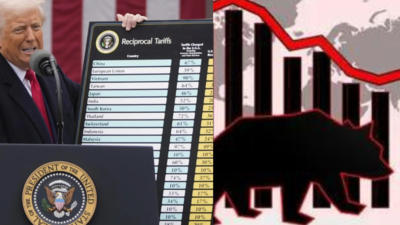India’s generic medicines steal the spotlight as US exempts pharma from tariffs

India’s pharma sector has emerged as a big winner amid Trump’s tariff woes, as the US has exempted pharmaceuticals from reciprocal tariffs, recognizing the vital role of India’s generic medicines in global healthcare. This decision comes amid US President Donald Trump’s announcement of 27 percent tariffs on imports from about 60 countries, including India, in retaliation to high import duties on American goods. Industry leaders are calling this exemption a significant win for India, reinforcing its status as a global pharmaceutical powerhouse.
The US administration’s decision to exempt pharmaceuticals from reciprocal tariffs emphasizes the essential role of generic medicines in global healthcare, Sudarshan Jain, Secretary General of the Indian Pharmaceutical Alliance (IPA) told news agency PTI.
Jain highlighted that the exemption underscores the importance of affordable, life-saving generic medicines for public health, economic stability, and national security. “India and the US share a strong, growing bilateral trade relationship, and pharmaceuticals remain a cornerstone of this partnership,” he said. Jain also emphasized India’s pivotal role in global and US healthcare by ensuring a steady supply of cost-effective medicines.
India’s pharmaceutical industry, he added, remains committed to furthering the shared priorities of both nations—strengthening the resilience of the medicine supply chain and reinforcing national security by ensuring access to affordable medications for all.
IPA, a network of top 23 Indian pharmaceutical companies including Sun Pharma, Dr Reddy’s Laboratories, Lupin, Torrent, and Glenmark, represents the sector’s growing influence.
Bhavin Mukund Mehta, Vice-Chairman of Pharmexcil and Whole-Time Director of Kilitch Drugs, noted that the pharmaceutical sector is emerging as a clear beneficiary of this decision.
“India exports USD 8.7 billion worth of pharmaceuticals to the US while importing just USD 800 million. This strong trade relationship creates a win-win scenario, driving significant cost savings on life-saving medicines,” Mehta stated.
He also highlighted that Indian exporters stand to gain a competitive advantage over their Asian counterparts, strengthening India’s global leadership in pharmaceuticals.
Sheetal Arora, Promoter and CEO of Mankind Pharma, described the exemption as a strategic recognition of the critical healthcare dependencies between the US and India. Arora pointed out that the US healthcare system heavily depends on India’s robust generic manufacturing and China’s active pharmaceutical ingredient (API) production. Any disruption in these supply chains would have immediate, severe consequences for patient care, he added.
Arora also emphasized that the exemption provides India with an opportunity to reshape its pharmaceutical sector. By focusing on next-generation generics, accelerating biosimilar development, and boosting domestic API production, India could reduce geopolitical vulnerabilities and further strengthen its position as the global pharmacy. He mentioned that initiatives like the Production Linked Incentive (PLI) scheme, along with targeted R&D incentives and regulatory harmonization, offer a framework to drive this transformation.
The pharmaceutical sector is India’s largest industrial export, valued at USD 12.72 billion in 2024. Indian pharmaceutical companies supply a significant portion of drugs to the US, with four out of ten prescriptions filled in the US in 2022 coming from Indian companies. In fact, medicines from Indian companies saved the US healthcare system USD 219 billion in 2022 and a total of USD 1.3 trillion from 2013 to 2022. Over the next five years, generics from Indian companies are expected to generate an additional USD 1.3 trillion in savings.
Experts had previously warned that higher tariffs on pharmaceutical imports to the US could increase production costs for Indian drug manufacturers, making their products less competitive. Smaller drug firms, operating on thin margins, could face financial pressure, potentially leading to consolidation or closure.




